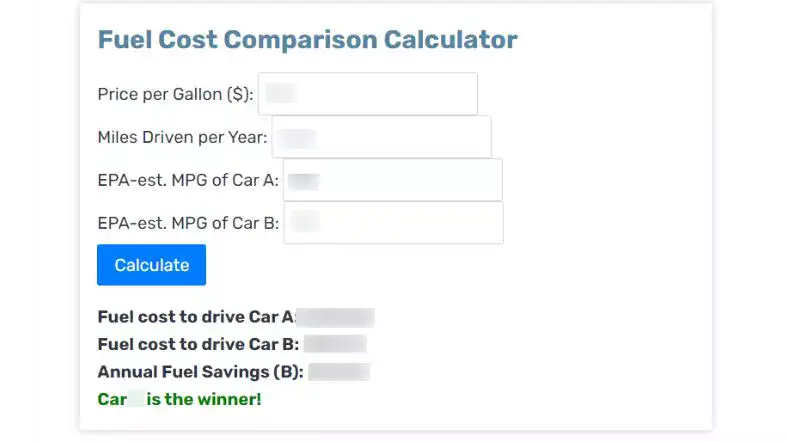Want to save money on gas? Our Fuel Cost Comparison Calculator helps you make informed decisions.
With four input options, you can easily compare fuel costs for two cars and see which one will save you more money.
Fuel Cost Comparison Calculator
How Our Fuel Cost Comparison Calculator Works
Now we will take a closer look at how the calculator works.
Step 1: Input the estimated gas price per gallon
The first step in using the Fuel Cost Comparison Calculator is to input the estimated gas price per gallon.
This information can be easily obtained by checking online resources or by visiting a local gas station.

Step 2: Input the number of miles driven per year
The next step is to input the number of miles you expect to drive each year.
This information is important because it helps the calculator determine the total fuel cost for each vehicle.
Step 3: Input the EPA-estimated fuel economy ratings (MPG)
The third step is to input the EPA-estimated fuel economy ratings (MPG) of the vehicles being compared.
The MPG is a measure of the fuel efficiency of a vehicle and is calculated based on standardized testing procedures.
Step 4: Calculate the fuel cost for each vehicle
With the above information, the calculator can now calculate the fuel cost for each vehicle.
It does this by multiplying the estimated gas price per gallon by the number of miles driven per year and dividing by the EPA-estimated fuel economy ratings (MPG) of the vehicle.
Step 5: Compare the fuel cost of each vehicle
Finally, the calculator compares the fuel cost of each vehicle and determines the annual fuel savings.
This is the difference between the fuel cost of the two vehicles and gives drivers a clear picture of which vehicle is the more cost-effective option.
5 Factors that Affect Fuel Prices

Crude Oil Prices
The price of crude oil is the primary factor that affects fuel prices. Crude oil is the raw material used to produce gasoline, diesel, and other fuels.
The cost of crude oil accounts for the majority of the retail price of gasoline and diesel.
When the price of crude oil increases, the cost of producing gasoline and diesel also increases, which leads to higher fuel prices at the pump.
Conversely, when the price of crude oil decreases, the cost of producing gasoline and diesel decreases, resulting in lower fuel prices at the pump.
Refining Costs
Refining costs are another factor that affects fuel prices.
Refineries must process crude oil into gasoline, diesel, and other fuels, and these processes require energy, labor, and materials.
When the cost of refining increases, the price of gasoline and diesel also increases.
Refining costs can be affected by factors such as maintenance and upgrades to refineries, as well as changes in regulations.
Distribution and Marketing Costs
The cost of transporting and marketing gasoline and diesel from refineries to retail outlets is another factor that affects fuel prices.
This cost includes the cost of shipping fuel by truck, rail, or tanker ship, as well as the cost of marketing and advertising.
When these costs increase, the price of gasoline and diesel at the pump also increases.
Geopolitical Factors
Geopolitical events and tensions can also have an impact on fuel prices.
Conflicts in oil-producing regions, such as the Middle East, can disrupt oil supplies and lead to higher fuel prices.
In addition, changes in government policies and regulations, such as sanctions on oil-producing countries, can also affect fuel prices.
Supply and Demand
The basic economic principle of supply and demand also affects fuel prices.
When demand for gasoline and diesel is high, prices tend to increase, and when demand is low, prices tend to decrease.
This can be influenced by a variety of factors, including seasonal changes in driving habits, economic growth and recessions, and technological advancements in fuel-efficient vehicles.
Cost of Gasoline vs. Diesel
The cost of gasoline and diesel can vary based on several factors such as the location, taxes, and the demand and supply of the fuels. However, in general, diesel tends to be more expensive than gasoline.
The reason for the higher cost of diesel is due to the more complex refining process compared to gasoline and the higher taxes imposed on diesel fuel in some countries.
Additionally, diesel engines are more efficient and produce more torque, leading to higher demand and, therefore, higher prices.
However, it’s important to note that the higher cost of diesel fuel can be offset by the fuel efficiency of diesel engines, which typically get better fuel economy than gasoline engines.
This means that, despite the higher cost of diesel fuel, diesel vehicles can save money on fuel costs in the long run.
Fuel Efficiency between Different Vehicles
The fuel efficiency of vehicles can vary greatly depending on several factors such as vehicle size, engine type, and driving conditions.
Here is a general comparison of fuel efficiency between different types of vehicles:
Compact Cars:
Compact cars are generally considered to be the most fuel-efficient vehicles.
They tend to have small engines, lightweight construction, and aerodynamic designs, all of which contribute to their high fuel efficiency.
Sedans:
Sedans are larger than compact cars, but many still offer good fuel efficiency.
For example, some hybrid and electric sedans can achieve fuel efficiency ratings of 40 miles per gallon or higher.
SUVs and Crossovers:
SUVs and crossovers tend to be less fuel-efficient than cars due to their larger size and weight.
However, some newer models incorporate fuel-saving technologies such as hybrid powertrains, which can greatly improve their fuel efficiency.
Pickup Trucks:
Pickup trucks are typically the least fuel-efficient vehicles due to their large size and heavy payload capacity.
Some newer pickup trucks offer more fuel-efficient options, such as diesel engines or aerodynamic designs.
Electric Vehicles:
Electric vehicles (EVs) offer the highest fuel efficiency of all vehicle types, measured in miles per kilowatt-hour (kWh) rather than miles per gallon.
EVs are powered solely by electricity and have no tailpipe emissions, which makes them a popular choice for those looking to reduce their environmental impact.
Final Thoughts
Our tool is a fuel cost comparison calculator that helps users determine the cost of driving two different cars based on the price per gallon of fuel, the miles driven per year, and the EPA-estimated MPG of each car.
The tool provides the user with an estimate of the cost of driving each car and the annual fuel savings between the two cars.
The tool is designed to be user-friendly and mobile-friendly, with a clean and modern interface.
The calculation process is straightforward and easy to understand, providing the user with an accurate and reliable estimate of the fuel costs for each car.
